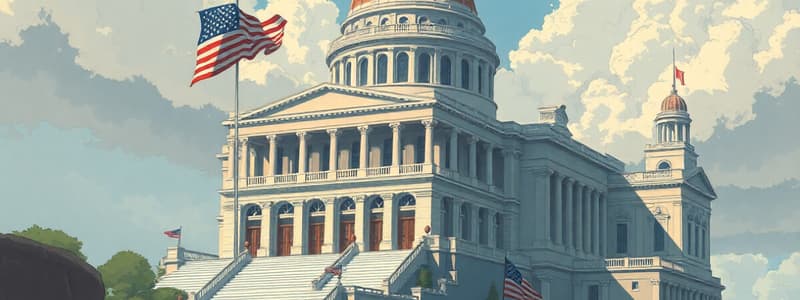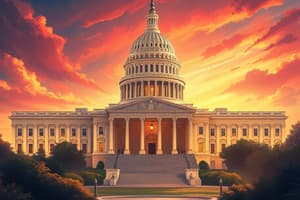Podcast
Questions and Answers
What was the proposal made by Virginia's delegates regarding legislative structure?
What was the proposal made by Virginia's delegates regarding legislative structure?
What did the Connecticut Compromise establish?
What did the Connecticut Compromise establish?
What is the minimum age requirement to serve in the Senate?
What is the minimum age requirement to serve in the Senate?
Why was the process of passing legislation through both houses intentionally made difficult?
Why was the process of passing legislation through both houses intentionally made difficult?
What change occurred with the Seventeenth Amendment regarding Senate elections?
What change occurred with the Seventeenth Amendment regarding Senate elections?
What was the reason Congress failed to reapportion House seats after the 1920 census?
What was the reason Congress failed to reapportion House seats after the 1920 census?
What is the average population in a congressional district currently surpassed?
What is the average population in a congressional district currently surpassed?
What is the primary goal of racially gerrymandered congressional districts?
What is the primary goal of racially gerrymandered congressional districts?
Which historic compromise determined how enslaved people were counted for congressional representation?
Which historic compromise determined how enslaved people were counted for congressional representation?
Which of the following is NOT an enumerated power of Congress?
Which of the following is NOT an enumerated power of Congress?
What is gerrymandering primarily concerned with?
What is gerrymandering primarily concerned with?
What does the term 'power of the purse' refer to?
What does the term 'power of the purse' refer to?
Which act helped clear hurdles for African American voter registration and voting?
Which act helped clear hurdles for African American voter registration and voting?
What defines implied powers within the context of Congress?
What defines implied powers within the context of Congress?
What is a characteristic of inherent powers in the context of congressional authority?
What is a characteristic of inherent powers in the context of congressional authority?
What was one significant result of the Constitutional Convention of 1787?
What was one significant result of the Constitutional Convention of 1787?
Which term describes the practice of drawing district boundaries to favor a particular political party?
Which term describes the practice of drawing district boundaries to favor a particular political party?
What was a main issue faced by the young republic that prompted the call for a Constitutional Convention?
What was a main issue faced by the young republic that prompted the call for a Constitutional Convention?
What does bicameralism refer to in the context of Congress?
What does bicameralism refer to in the context of Congress?
Which of the following historical events highlighted the weaknesses of the Articles of Confederation and contributed to the Constitutional Convention?
Which of the following historical events highlighted the weaknesses of the Articles of Confederation and contributed to the Constitutional Convention?
Which power is NOT explicitly granted to Congress or any branch of government?
Which power is NOT explicitly granted to Congress or any branch of government?
What is the significance of Article I, Section 8's commerce clause?
What is the significance of Article I, Section 8's commerce clause?
In which landmark case did the Supreme Court assert its authority to declare laws unconstitutional?
In which landmark case did the Supreme Court assert its authority to declare laws unconstitutional?
What event significantly contributed to the increase in presidential power in the 20th century?
What event significantly contributed to the increase in presidential power in the 20th century?
Why did Congress propose the Twenty-Second Amendment to the Constitution?
Why did Congress propose the Twenty-Second Amendment to the Constitution?
What significant event in the 1950s highlighted the power struggle between the presidency and Congress?
What significant event in the 1950s highlighted the power struggle between the presidency and Congress?
What primary characteristic differentiates the terms of House members from that of Senators?
What primary characteristic differentiates the terms of House members from that of Senators?
Which of the following best describes the leadership structure of the House of Representatives compared to the Senate?
Which of the following best describes the leadership structure of the House of Representatives compared to the Senate?
What trend has been observed regarding the presidential use of executive orders?
What trend has been observed regarding the presidential use of executive orders?
How has campaign funding evolved in modern U.S. political campaigns?
How has campaign funding evolved in modern U.S. political campaigns?
What is a key reason incumbents tend to win reelection in congressional races?
What is a key reason incumbents tend to win reelection in congressional races?
What financial advantage do incumbents have over challengers during elections?
What financial advantage do incumbents have over challengers during elections?
What phenomenon describes the difficulty of unseating incumbents in elections?
What phenomenon describes the difficulty of unseating incumbents in elections?
What role does political party support play in the success of incumbents?
What role does political party support play in the success of incumbents?
What was a significant outcome of Eric Cantor's defeat in the primary election?
What was a significant outcome of Eric Cantor's defeat in the primary election?
What significant change occurred as a result of the Citizens United v. Federal Election Commission ruling?
What significant change occurred as a result of the Citizens United v. Federal Election Commission ruling?
What is the primary purpose of the Bipartisan Campaign Reform Act (BCRA)?
What is the primary purpose of the Bipartisan Campaign Reform Act (BCRA)?
How much can an individual contribute per candidate per election as established by campaign finance laws?
How much can an individual contribute per candidate per election as established by campaign finance laws?
What role do super PACs play in campaign financing?
What role do super PACs play in campaign financing?
What was a significant issue with campaign finance laws in the early attempts at reform?
What was a significant issue with campaign finance laws in the early attempts at reform?
Flashcards
Bicameralism
Bicameralism
A system of government with a two-chamber legislature, like the U.S. Congress, which consists of the House of Representatives and the Senate.
Apportionment
Apportionment
The process of dividing the 435 seats in the House of Representatives among the states based on their population.
Gerrymandering
Gerrymandering
The practice of manipulating the boundaries of electoral districts to favor a particular party or group, often resulting in unfair representation.
Enumerated Powers
Enumerated Powers
Signup and view all the flashcards
Implied Powers
Implied Powers
Signup and view all the flashcards
Majority-Minority District
Majority-Minority District
Signup and view all the flashcards
Constituency
Constituency
Signup and view all the flashcards
Voting Rights Act Challenge
Voting Rights Act Challenge
Signup and view all the flashcards
Connecticut Compromise
Connecticut Compromise
Signup and view all the flashcards
Senate's Equal Representation
Senate's Equal Representation
Signup and view all the flashcards
House of Representatives' Proportional Representation
House of Representatives' Proportional Representation
Signup and view all the flashcards
Purpose of Bicameral System
Purpose of Bicameral System
Signup and view all the flashcards
Commerce Clause
Commerce Clause
Signup and view all the flashcards
Broad Interpretation of the Commerce Clause
Broad Interpretation of the Commerce Clause
Signup and view all the flashcards
United States v. Lopez (1995)
United States v. Lopez (1995)
Signup and view all the flashcards
Judicial Review
Judicial Review
Signup and view all the flashcards
Commander-in-Chief
Commander-in-Chief
Signup and view all the flashcards
Executive Orders
Executive Orders
Signup and view all the flashcards
Executive Agreements
Executive Agreements
Signup and view all the flashcards
Power of the Purse
Power of the Purse
Signup and view all the flashcards
Necessary and Proper Clause
Necessary and Proper Clause
Signup and view all the flashcards
Inherent Powers
Inherent Powers
Signup and view all the flashcards
Congressional Oversight
Congressional Oversight
Signup and view all the flashcards
Incumbency Advantage
Incumbency Advantage
Signup and view all the flashcards
Safe Seats
Safe Seats
Signup and view all the flashcards
Party Support for Incumbents
Party Support for Incumbents
Signup and view all the flashcards
Constituent Casework
Constituent Casework
Signup and view all the flashcards
Incumbent Advantage: Alive and Well?
Incumbent Advantage: Alive and Well?
Signup and view all the flashcards




